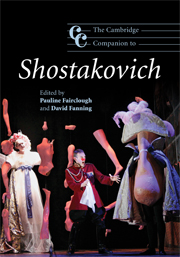Book contents
- Frontmatter
- Introduction
- PART I Instrumental works
- PART II Music for stage and screen
- 6 Shostakovich and the theatre
- 7 Shostakovich as opera composer
- 8 Shostakovich's ballets
- 9 Screen dramas: Shostakovich's cinema career
- PART III Vocal and choral works
- PART IV Performance, theory, reception
- Notes
- Select bibliography
- Index
6 - Shostakovich and the theatre
from PART II - Music for stage and screen
Published online by Cambridge University Press: 28 September 2011
- Frontmatter
- Introduction
- PART I Instrumental works
- PART II Music for stage and screen
- 6 Shostakovich and the theatre
- 7 Shostakovich as opera composer
- 8 Shostakovich's ballets
- 9 Screen dramas: Shostakovich's cinema career
- PART III Vocal and choral works
- PART IV Performance, theory, reception
- Notes
- Select bibliography
- Index
Summary
In the first twenty years of his career, Shostakovich wrote a dozen incidental scores for the theatre. In length and variety they represent a substantial part of his output, yet they are surprisingly little known. There are practical and historical explanations for their neglect, but also good reasons why they are worth looking at. In the first place, Shostakovich's early theatrical experience was in so many ways the key to his rapidly evolving artistic character and technique. By contrast with his music of later years, his output through to the first half of the 1930s was overwhelmingly dominated by drama of different kinds, including two full-length operas, a third uncompleted opera, three full-length ballets, a score for the live accompaniment of a silent movie, three or four of his finest sound-movie scores, an unfinished musical comedy, a full-length show for the music hall and his first six sets of incidental music. As the conductor Gennady Rozhdestvensky has observed, for Shostakovich at this time the theatre was a ‘laboratory’ in which he could experiment and develop his skills in an abundance of ways. If these incidental scores do not have the mastery and finish of the operas or the brilliance and span of the ballets, they still reveal much about what went on in that laboratory. Writing at speed and usually under harsh conditions, he was forced to invent weird vocal and instrumental combinations, to set sometimes preposterously improbable texts and, more generally, to hone his quickfire ability to solve dramatic and creative problems thrown in his way not by the demands of his own imagination, but by the day-to-day requirements of those in charge of the productions he was working on.
- Type
- Chapter
- Information
- The Cambridge Companion to Shostakovich , pp. 145 - 178Publisher: Cambridge University PressPrint publication year: 2008
- 2
- Cited by

